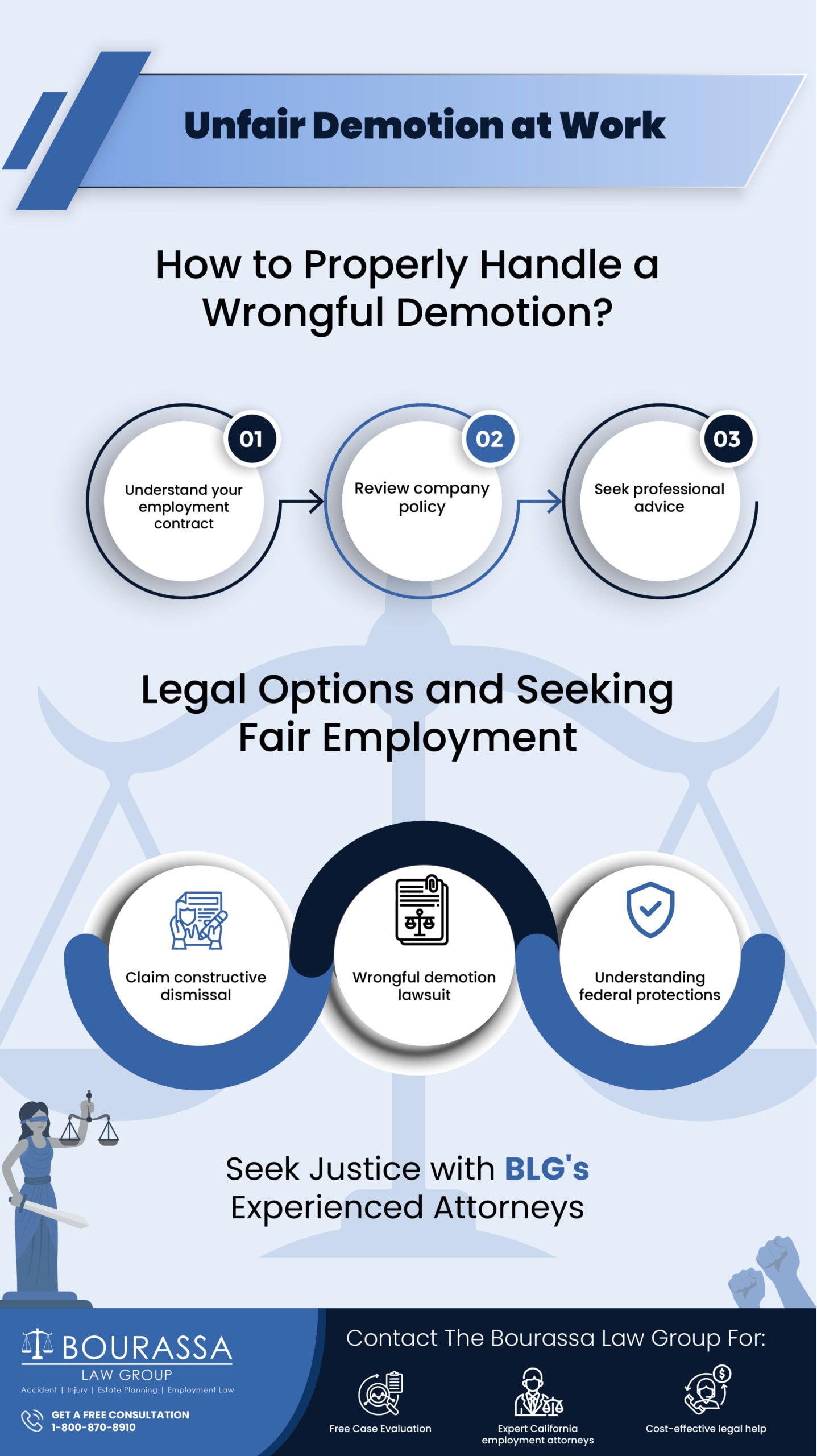
In the dynamic landscape of today’s professional world, facing a demotion at work can be a challenging and demoralizing experience. If you believe you’ve been unfairly demoted, it’s crucial to understand your legal rights and explore the options available to rectify the situation. This article aims to shed light on the concept of unfair demotion, guide you through potential courses of action, and provide insights into the legal aspects surrounding this issue.
What is Unfair Demotion?
Unfair or wrongful demotion occurs when an employee is moved to a lower position, often accompanied by a reduction in pay or job responsibilities, without valid or justifiable reasons. In some cases, demotions may be implemented for discriminatory, unlawful, or retaliatory motives. Understanding the grounds for demotion is crucial for determining if the action taken against you is, indeed, unjust.
When Can Employees be Demoted?
In the majority of U.S. states, employment is considered “at-will,” meaning that employers have the right to terminate or demote employees for nearly any reason, or the employment relationship does not depend on a contract as long as it’s not illegal or discriminatory. However, there are instances when demotions cross the line into illegality. Demoting an employee based on protected characteristics such as race, gender, sexual orientation, or engaging in protected activities like whistleblowing can constitute wrongful demotion.
How to Properly Handle a Wrongful Demotion?
If you find yourself wrongfully demoted, it’s crucial to handle the situation carefully. Here are steps you can take:
Understand Your Employment Contract: Review your employment contract, if you have one, to determine the terms and conditions of your employment. Contracts may provide protection against arbitrary demotions.
Review Company Policy: Familiarize yourself with your company’s policies and procedures. Some organizations have specific guidelines outlining the demotion process and conditions under which it can occur.
Seek Professional Advice: Consult with an employment lawyer to understand the legal implications of your situation. They can provide insights into potential legal actions and strategies for addressing the issue.
At-Will Demotions and the Safety Net Provided by Employment Contracts
In at-will employment states like California, employers can generally demote employees at their discretion, as long as it doesn’t violate federal or state laws. However, having an employment contract can provide a safety net for employees. Employment contracts may include clauses that limit the grounds for demotion, ensuring a fair process and protecting employees from arbitrary decisions.
Appealing a Demotion in the Workplace
If you believe your demotion is unjust, you have the right to appeal the decision. The process for appealing a demotion varies across companies, but it typically involves the following steps:
Making a Request to Appeal: Notify your HR department or supervisor of your intent to appeal the demotion. Clearly state your reasons and provide any supporting evidence.
Reviewing Company Policy: Check your company’s policies regarding demotion appeals. Some companies have established procedures and timelines for filing appeals that you must adhere to.
An Unlawful Demotion and Its Impact
An unlawful demotion goes beyond a simple change in job title or responsibilities. It involves discriminatory or retaliatory actions by employers, violating employees’ rights. The impact of such demotions extends beyond the professional realm, affecting an individual’s self-esteem and overall well-being.
Employees who believe they have been unlawfully demoted should be aware of their legal rights and potential courses of action. Federal protections exist to safeguard employees from discriminatory practices and unjust demotions.
The Role of Human Resources in Unfair Demotion Cases
The Human Resources department plays a pivotal role in addressing unfair demotion cases. If you believe you’ve been demoted unlawfully, consider the following steps:
Discuss the Issue with HR: Schedule a meeting with your HR representative to discuss the demotion and express your concerns. They may be able to provide insights into the decision-making process.
Consult HR Policies: Review your company’s HR policies to understand the demotion process and any provisions for appealing such decisions.
Document the Circumstances: Keep detailed records of the events leading up to and following the demotion. This documentation can serve as valuable evidence if legal action becomes necessary.
Protecting Your Employment Rights
It’s essential for employees to be aware of their rights and take proactive steps to protect themselves from unfair demotions. Understanding the circumstances under which demotions are unlawful empowers individuals to navigate their professional challenges effectively.
Legal Options and Seeking Fair Employment
If you find yourself in the unfortunate position of being wrongfully demoted, it’s crucial to explore your legal options. Consult with an employment lawyer to discuss the specifics of your case and determine the best course of action.
Claim Constructive Dismissal
A wrongful demotion may, in some cases, be considered constructive dismissal – a situation where the employee resigns due to a fundamental breach of the employment contract by the employer. This legal concept can provide a basis for a lawsuit.
Wrongful Demotion Lawsuit
Initiating a wrongful demotion lawsuit may be necessary if your employer fails to address the issue or rectify the demotion. An attorney can guide you through the process, helping you gather evidence and build a strong case.
Understanding Federal Protections
Federal laws, such as those enforced by the Equal Employment Opportunity Commission (EEOC), offer additional layers of protection against unfair treatment in the workplace. If your demotion is based on discriminatory reasons, filing a complaint with the EEOC can be a step towards seeking justice.
How an Attorney Can Help You Navigate Unfair Demotion at Work
Facing an unfair demotion at work can be a daunting experience, leaving you feeling powerless and unsure of your next steps. In such situations, enlisting the assistance of an experienced employment attorney can be instrumental in navigating the legal complexities surrounding wrongful demotion. Here’s how an attorney can support you in seeking justice and restoring your professional standing:
Legal Assessment: Evaluate the details of your case to determine if the demotion violates employment laws.
Understanding Your Rights: Educate you on your rights as an employee, including protections against discrimination and unfair demotion.
Legal Strategies: Develop a tailored legal strategy based on the specifics of your situation.
Communicating with Your Employer: Serve as a mediator, drafting professional communications, and negotiating with your employer.
Filing Administrative Complaints: Assist in filing administrative complaints with relevant agencies, such as the EEOC.
Initiating Legal Proceedings: Help file a lawsuit if informal negotiations and administrative complaints don’t lead to a resolution.
Negotiating Settlements: Engage in settlement discussions with your employer to achieve a fair resolution.
Providing Emotional Support: Offer emotional support and guidance throughout the legal process.
Protecting Against Retaliation: Take steps to safeguard against retaliation, including documentation and advice on handling workplace situations.

Seek Justice with BLG’s Experienced Attorneys
Unfair demotion at work is a challenging situation that requires careful navigation of legal avenues. Understanding the nuances of your employment contract, company policies, and federal protections is essential for anyone facing the impact of an unjust demotion. Seeking professional advice and taking decisive steps to appeal or file a complaint can empower you to assert your rights and work towards a fair resolution. Remember, no one should endure the consequences of an unfair demotion in silence – explore your legal options and reclaim your professional standing.
If you’ve experienced the distressing impact of an unfair demotion at work, BLG is here to help you navigate the legal complexities surrounding your situation. Our experienced employment attorneys specialize in addressing wrongful demotion cases, offering personalized guidance to protect your rights.
Contact us today for a free consultation.
FAQs
What to do if wrongfully demoted?
If wrongfully demoted, gather evidence to support your wrongful demotion claim, and calmly discuss the situation with your supervisor or HR. If necessary, escalate the issue within the company’s hierarchy or seek legal advice.
Do I have to accept a demotion at work?
In most cases, you have the right to discuss the demotion with your employer and express your concerns. However, refusing a demotion might have consequences, such as termination. It’s advisable to communicate openly and explore alternative solutions.
How do you respond to being demoted at work?
Maintain professionalism and take time to understand the reasons behind the demotion. Seek feedback to address any performance issues and create a plan for improvement. Consider discussing your concerns with superiors and exploring opportunities for growth within the organization.





